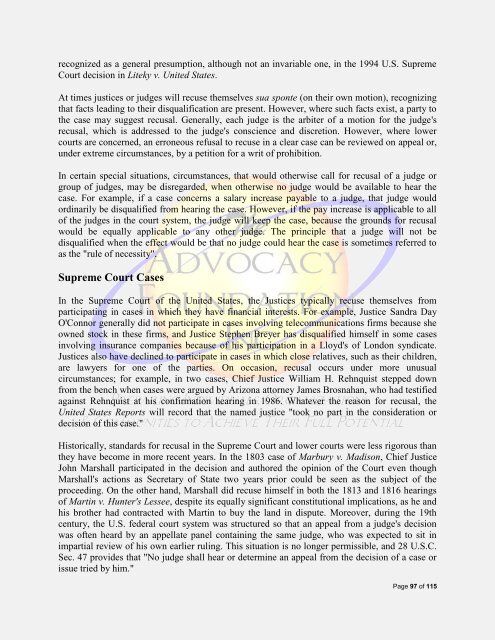Judicial ReEngineering
Judicial ReEngineering
Judicial ReEngineering
Create successful ePaper yourself
Turn your PDF publications into a flip-book with our unique Google optimized e-Paper software.
ecognized as a general presumption, although not an invariable one, in the 1994 U.S. Supreme<br />
Court decision in Liteky v. United States.<br />
At times justices or judges will recuse themselves sua sponte (on their own motion), recognizing<br />
that facts leading to their disqualification are present. However, where such facts exist, a party to<br />
the case may suggest recusal. Generally, each judge is the arbiter of a motion for the judge's<br />
recusal, which is addressed to the judge's conscience and discretion. However, where lower<br />
courts are concerned, an erroneous refusal to recuse in a clear case can be reviewed on appeal or,<br />
under extreme circumstances, by a petition for a writ of prohibition.<br />
In certain special situations, circumstances, that would otherwise call for recusal of a judge or<br />
group of judges, may be disregarded, when otherwise no judge would be available to hear the<br />
case. For example, if a case concerns a salary increase payable to a judge, that judge would<br />
ordinarily be disqualified from hearing the case. However, if the pay increase is applicable to all<br />
of the judges in the court system, the judge will keep the case, because the grounds for recusal<br />
would be equally applicable to any other judge. The principle that a judge will not be<br />
disqualified when the effect would be that no judge could hear the case is sometimes referred to<br />
as the "rule of necessity".<br />
Supreme Court Cases<br />
In the Supreme Court of the United States, the Justices typically recuse themselves from<br />
participating in cases in which they have financial interests. For example, Justice Sandra Day<br />
O'Connor generally did not participate in cases involving telecommunications firms because she<br />
owned stock in these firms, and Justice Stephen Breyer has disqualified himself in some cases<br />
involving insurance companies because of his participation in a Lloyd's of London syndicate.<br />
Justices also have declined to participate in cases in which close relatives, such as their children,<br />
are lawyers for one of the parties. On occasion, recusal occurs under more unusual<br />
circumstances; for example, in two cases, Chief Justice William H. Rehnquist stepped down<br />
from the bench when cases were argued by Arizona attorney James Brosnahan, who had testified<br />
against Rehnquist at his confirmation hearing in 1986. Whatever the reason for recusal, the<br />
United States Reports will record that the named justice "took no part in the consideration or<br />
decision of this case."<br />
Historically, standards for recusal in the Supreme Court and lower courts were less rigorous than<br />
they have become in more recent years. In the 1803 case of Marbury v. Madison, Chief Justice<br />
John Marshall participated in the decision and authored the opinion of the Court even though<br />
Marshall's actions as Secretary of State two years prior could be seen as the subject of the<br />
proceeding. On the other hand, Marshall did recuse himself in both the 1813 and 1816 hearings<br />
of Martin v. Hunter's Lessee, despite its equally significant constitutional implications, as he and<br />
his brother had contracted with Martin to buy the land in dispute. Moreover, during the 19th<br />
century, the U.S. federal court system was structured so that an appeal from a judge's decision<br />
was often heard by an appellate panel containing the same judge, who was expected to sit in<br />
impartial review of his own earlier ruling. This situation is no longer permissible, and 28 U.S.C.<br />
Sec. 47 provides that "No judge shall hear or determine an appeal from the decision of a case or<br />
issue tried by him."<br />
Page 97 of 115

















